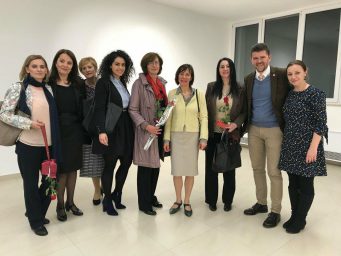The Association for helping children and women victims of domestic violence, Women’s Centre was legally registered on 22 April 2002. This Association was founded on the initiative of 20 citizens who believe that domestic violence is a social problem, and as such it is not socially recognized enough.
Our first activities were based on organizing human rights workshops for women, victims of domestic violence. The lecturers were our members, educated in that particular area, who did this on the voluntary basis. There had been around 60 women who attended these workshops.
We have also organized a round table “Women in politics” with a lecturer from a neighbouring country, Mrs. Lejla Ruždić – Trifunović, who is a coordinator of a political network of women in Serbia and a vice president of a Democratic Centre Party (one of the important parties in Serbia and Montenegro). The round table was intended for young activists from all political parties in local community, while the aim of it was advancement of female politician’s consciousness about importance of joint action regarding improvement of children and women position, regardless of which party female politicians might belong to.
We have organised a public discussion on Family Law in Republika Srpska. The reason for organizing it was the fact that we strongly believed that the Draft of Family Law did not protect interests of children and women in our Republic in a satisfactory way. On that occasion we had representatives of the District Court, the Public Welfare Centre, schools, hospital, various NGOs, IPTF (International Police Task Force) and other international organizations and a big number of citizens. The representatives of the above mentioned institutions actively participated in giving suggestions for modification and amendments to the Family Law draft. Consequently, we sent our amendments to the National Assembly RS. Unfortunately, there was no reaction to it whatsoever. We have to emphasize that the round table, as well as the public discussion had significant media coverage by both local and national TV and Radio stations.
During 2002 the number of our members has increased. Women of various professions (doctors, teacher, etc.) wanted to contribute to development of our organization capacity and became our members. All activities in that period were financed by members themselves, since we believed that we had to prove that we have willingness, strengths and knowledge.
In 2002 we also had some educational programmes for individuals, members of our organization for areas of social policy; work with victims, as well as training in writing project proposals and strengthening our organization capacities. In November 2002 we started a research project on domestic violence in Trebinje municipality which was implemented 11 months later. It was supported by DFID organization, while the Public Welfare Centre helped as an implementation partner. Within this project we had workshops for children who suffered domestic violence; we also had radio shows, as well as workshops for other victims of domestic violence. The research aimed to study existing documents concerning victims of domestic violence in period form 1996 to 2002, from different institutions such as: the emergency, the Public Welfare Centre, the police, the district attorney’s office and the courts. We also did the research on legislation regarding this issue. Prior to this research we conducted a poll among citizens on this issue, interviewing 350 citizens, which represents 1% of total population of Trebinje. We also made interviews with professionals in this area (of domestic violence) as well as with victims.
The aim of organizing playrooms for children was an attempt to make children show their emotions and needs freely, through drawings and games. Our round tables were primarily meant for women, victims of domestic violence who needed a support in overcoming their crisis and in process of strengthening their personalities. This entire project was supported by DFID.

